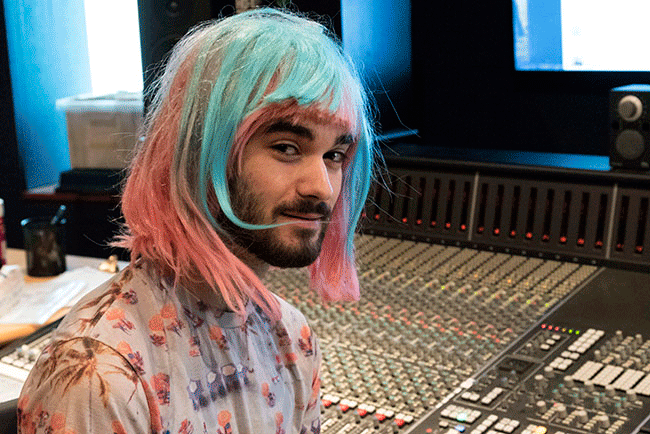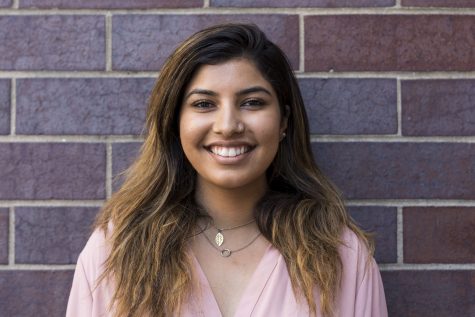Meet the DJ: Max Rosenzweig
April 11, 2016
As we sat in a recording room on the fifth floor of Tisch’s Recorded Music studios, music producer Max Rosenzweig meticulously tried to fix his bright pink and blue wig to the top of his head.
“I have to make sure it looks halfway decent,” Rosenweig laughed, combing his fingers through the front of the wig. “I mean, it always looks messy, but that’s part of the charm.”
Rosenzweig, known by his artist name “Diveo,” produces pop-inspired electronic music, with about 10 albums released in the last five years and 20 live performances, always donning his colorful wig. Currently a Clive Davis Institute of Recorded Music at Tisch sophomore, Rosenzweig knew he had an interest in music from the first time he could talk.
“It started out when I was in preschool, when I was practically drumming on everything,” Rosenzweig said. “I’d drum on pots and pans, and watch all these videos of crazy drummers, like the one from Rush. But when I was 11, I discovered production by playing around with GarageBand on my Mac. It was a thrill that I couldn’t get from drumming.”
For Rosenzweig, creating digital sounds is a way to put yourself into the music and convey expressions through a different medium.
“Electronic music is an extension of emotion through digital technology, where you can take a computer and use it to extend who you are,” Rosenzweig said. “When I started producing on a computer, all I heard were possibilities that had never been explored.”
Previously, Rosenzweig’s artist name was “Statue of Diveo,” and he released his first album under this title when he was 13. Since then, he has continued releasing a few albums every year, and has built a loyal following of 7,500 followers on SoundCloud, in addition to selling his music on Bandcamp and iTunes.
Rosenweig describes his music as “sweet and cute” underground electronic music, and house music with a focus on drum and bass. Although he’s inspired by pop music, he doesn’t necessarily see it is a specific genre as much as a method of expression.
He said, “Pop is a way of conveying that uses simple techniques that are very catchy, with a pattern. It makes you crave what happens next, and then it gives you that. Pop paints a picture for the audience.”
When Rosenzweig creates a song, his process always starts with a compelling idea and ends when he feels like his personality is loud and full in the track.
“I start by experimenting with a compelling element, which turns into the core of a song, or one sound I can play around with that’s compelling enough for me to turn into a section,” Rosenzweig said. “Another section can emerge through previous sections, and then I start thinking about lyrics and how to write them. I just have to make sure every part of the song sounds very cool.”
Although his focus is in producing the music, Rosenzweig often includes his own experimental vocals. He is able to transform his voice to sound like a female’s, and has multiple girl’s voices that he uses on his tracks. Rosenzweig was inspired by pop music that contained bubbly, hyper-feminine vocals.
The songs most dear to Rosenzweig include “Summer Trees,” “Fever Dreams” and “We’re Beautiful,” all pieces he has either sung or written entirely. He’s performed at Webster Hall, Knitting Factory and Jack New York, a Chinese restaurant in Wall Street that’s known to feature upcoming and dynamic artists.
When thinking about the future, Rosenzweig knows one thing: he wants to be known. Rosenzweig’s goal is for the world to recognize Diveo for his work as an artist.
“I want to be a pop star,” Rosenzweig said. “It seems unlikely, but I’ve done a lot of unlikely things. There’s no limit to how much I can dream. When that’s the attitude, I think something’s going to go right.”
You can listen to “Fever Dreams” and “Summer Trees,” along with Diveo’s other songs at https://soundcloud.com/diveo.
A version of this article appeared in the Monday, April 11 print edition. Email Ankita Bhanot at [email protected].
























































































































































